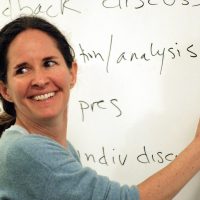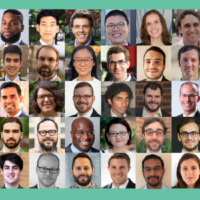
Learning the Language of Technology Students like Rocio Perez MPP '23 can now earn a certificate to show they understand the power of programming in policy analysis
By Stan Paul
The second cohort of alumni to earn a new certificate from UCLA Luskin entered the workforce in June with proof of their technical capabilities.
Although quantitative and qualitative research have long been part of a graduate education at the Luskin School, the Data Analytics Certificate recognizes students who focus on techniques and resources related to quantitative data analytics with the aid of powerful programming languages such as Python and R.
“Data can change hearts and minds,” said Zachary Steinert-Threlkeld, the professor of public policy and political science who started the program and serves as faculty lead. His own research and teaching focus on subnational conflict, statistics and advanced data analysis, including “big data.”
The certificate program has two benefits, Steinert-Threlkeld said, “and I think they’re equally important.” One signals to employers that a graduate has the ability to acquire, process, analyze and convey different data sets in general. The second benefit comes primarily from the program’s competency product requirement, which can be completed through class projects, a capstone project with a quantitative aspect, or doing work or an internship that involves using these programming tools.
Before coming to UCLA Luskin, Rocio Perez MPP ’23 had reached a point in her career where she couldn’t assist her supervisor with technical matters in the way she wanted.
“It felt like a missed opportunity. Had I had those skills, I would have been able to jump in and help my boss with analyzing data,” she said. “I didn’t want to feel that way anymore.”
Perez had noticed the power of mixed-methods research, and that led her to pursue graduate study and a career at the intersection of immigration and health.
“I wanted to get these quantitative skillsets because I knew how useful they would be,” she said.
As a graduate student, Perez also was a policy fellow for the UCLA Latino Policy and Politics Institute (LPPI). She found herself creating data visualizations for LPPI even as she was learning about them in a statistics class.
Not coming from a STEM background, Perez was intimidated at first, but she persevered. “It really helped to put in practice what I was learning in class.”
Not only do students like Perez complete a minimum of three data-focused courses, they have to provide a work product that demonstrates their ability at a higher level. To receive competency product credit, the work must involve the use of
code and demonstrate advanced skills such as — but not limited to — geospatial analysis, machine learning, natural language processing, network analysis, regression analysis, structural equation modeling or visualization.
The Data Analytics certificate’s areas of emphasis are:
- Spatial Analysis, which includes courses on geographic information systems (GIS) and mapping;
- Data Science, using programs such as R;
- Advanced Methods, statistics courses with a strong programming component;
- Program Evaluation, tools and survey methods courses with
a technological focus; - Technology Policy and Ethics, courses that focus on data, technology and its use in policymaking and governing.
Most Master of Public Policy students come in with little or no programming experience, and a sizable number of them want to acquire it in graduate school, Steinert-Threlkeld said. “I think the certificate is becoming more attractive at the application stage, but it’s rare that a student comes in being good at R or Python.”
Steinert-Threlkeld also spoke about how these additional skills fit into the policy arena and how they will be relevant for the School’s alumni when launching into careers.
“The demand for these skills is placed on the people who are doing other jobs in the organization; it’s rare for a policy organization to have a full-time data analytics person, whether we’re talking about Capitol Hill or Sacramento,” he explained. “So, in the policy world, the data analysis is an additional skill set as opposed to the primary one.”
Following graduation, Perez landed a position as a health policy analyst with the nonpartisan UnidosUS, a Washington-based nonprofit organization that serves as the nation’s largest Hispanic civil rights and advocacy organization.
“It was very intentional, pursuing this,” Perez said. “Employers really look for concrete projects and examples that you’ve taken part in,” and the certificate provides that proof. “It’s like a cherry on the top.”









Leave a Reply
Want to join the discussion?Feel free to contribute!